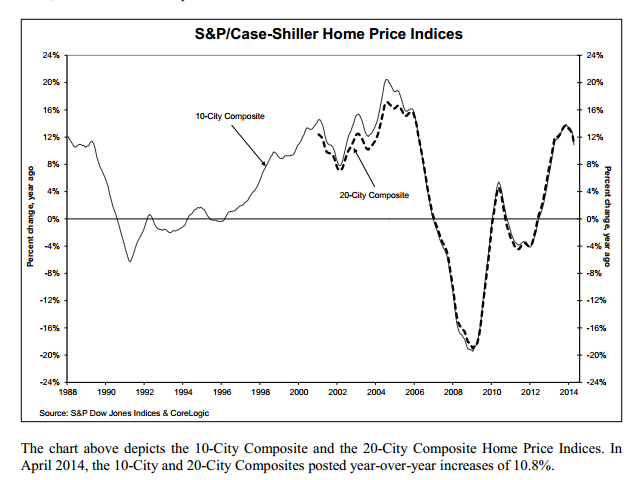Market Data

June 24, 2014
Growth in Home Prices Slows in April
Written by Sandy Williams
Home prices on an annual basis slowed more than expected in April according to the S&P/Case Shiller Home Price Indices. Indices for both the 10 and 20-city composites showed an annual gain of 10.8 percent, down from 12.4 percent in March and lower than economist expectations of 11.4 percent. Annual gains were lower in 19 of the 20 cities when compared to March, down by approximately three percent.

“Although home prices rose in April, the annual gains weakened,” says David M. Blitzer, Chairman of the Index Committee at S&P Dow Jones Indices. “Overall, prices are rising month-to-month but at a slower rate. Last year some Sunbelt cities were seeing year-over-year numbers close to 30%, now all are below 20%: Las Vegas (18.8%), Los Angeles (14.0%), Phoenix (9.8%), San Diego (15.3%) and San Francisco (18.2%). Other cities around the nation are also experiencing slower price increases.
“While the annual numbers worsened, the monthly figures were seasonally strong. Five cities – Atlanta, Boston, Chicago, San Francisco and Seattle – reported monthly gains of 2% or more. Dallas and Denver gained 1.6% and continue to set new peaks. Boston and Charlotte are less than 10% away from their peaks.
“Near term economic factors favor further gains in housing: mortgage rates are lower than a year ago, the Fed is expected to keep interest rates steady until mid-2015 and the labor market is improving. However, housing is not back to normal: prices are being supported by cash sales, low inventories and declining foreclosure and REO sales. First time home buyers are not back in force and qualifying for a mortgage remains challenging. The question is whether housing will bounce back before the Fed begins to tighten sometime next year.”







